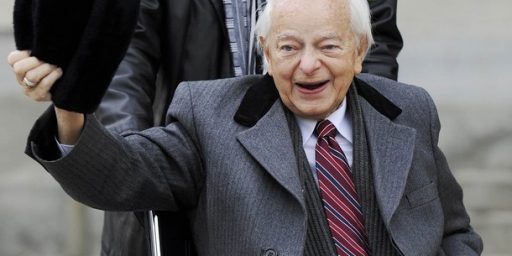Daniel Inouye, Senator And Medal Of Honor Recipient, Dies At 88
Daniel Inouye, who has served as a representative of Hawaii in Washington ever since it became a state, died today at the age 88:
U.S. Sen. Daniel K. Inouye of Hawaii, a highly decorated World War II combat veteran who used his status as one of the longest-serving and most powerful Democrats in Washington to funnel billions of dollars to his home islands, died Dec. 17 at Walter Reed National Military Medical Center in Bethesda. He was 88.
Peter Boyland, a spokesman for the senator, said the cause was respiratory complications.
Sen. Inouye cut a singular figure in the nation’s capital when he arrived in Washington in 1959 as a representative from the nation’s newest state and the first Japanese American elected to Congress.
A methodical behind-the-scenes operator who rarely sought the media spotlight, he was little known outside Hawaii and the halls of the Capitol. But his wartime record, for which he received the nation’s highest military award for valor, the Medal of Honor — coupled with his reputation for a bipartisan approach to politics — helped him gain respect and influence from colleagues of both parties in Washington.
After serving in the House, he was elected to the U.S. Senate in 1962 and began a career as Hawaii’s most important patron in Washington. As longtime chairman of the Appropriations defense subcommittee — and since 2009, of the entire Appropriations Committee — Sen. Inouye ensured Hawaii, once a farflung agricultural outpost, received a steady flow of dollars to develop military sites and modern transportation, communication and education systems.
Proudly describing himself as “the No. 1 earmarks guy in the U.S. Congress,” he was — along with his friend and political ally Ted Stevens, the late Republican senator from Alaska — one of the last unapologetic purveyors of political pork.
Sen. Inouye came to national attention only on occasion, most notably when he helped orchestrate inquiries into the Watergate scandal and Iran-Contra affair — two of Congress’s most politically explosive investigations into alleged White House wrongdoings. But he was a towering personality in Hawaii, where had had been born to working-class Japanese immigrants.
He grew up planning to become a doctor until 1942, when as a teenager barely out of high school, he joined what would become a revered Army regiment of Japanese Americans.
On an Italian battlefield two years later, he destroyed three enemy machine gun nests even as bullets tore through his stomach and legs. A grenade nearly ripped off his right arm, and it was later amputated in an Army hospital.
Back in the United States, the young lieutenant was wearing his empty right sleeve pinned to his officer’s uniform when he stepped into a San Francisco barbershop for a haircut. “We don’t serve Japs here,” the barber told him.
Memories of such encounters remained vivid to Sen. Inouye, who in his political career spoke eloquently in support of civil rights and social welfare programs.
(…)
In Washington, Sen. Inouye exercised a taciturn authority as a keeper of fading Senate traditions, including collegiality and bipartisan compromise. In 1973, he served on the bipartisan Senate panel that conducted investigative hearings on the Watergate scandal.
The hearings, which gathered reams of evidence about the White House coverup of illegal activities by President Richard M. Nixon’s reelection campaign, led to the indictment of dozens of administration officials and helped spur Nixon’s resignation in August 1974.
Watched by millions of viewers on network television over the course of three months, the sessions also introduced Sen. Inouye to the public as an undaunted questioner of top White House aides, including H.R. Haldeman and John D. Ehrlichman.
Ehrlichman’s sworn testimony prompted a rare moment of unguarded emotion from Sen. Inouye: “What a liar!” he whispered into a microphone he mistakenly thought was dead.
The next week, Ehrlichman’s attorney referred to Sen. Inouye as “that little Jap,” prompting a wave of thousands of telegrams and letters in support of the senator.
Sen. Inouye’s widely praised performance won the attention of powerful Democrats including Robert C. Byrd of West Virginia. As majority leader, Byrd chose Sen. Inouye as the first chairman of the Senate Select Committee on Intelligence, established in 1976 to prevent civil-liberties abuses by U.S. intelligence agencies.
Sen. Inouye was clearly a rising force in his party in 1978, when he was elected party secretary, the third-ranking leadership post among Senate Democrats. He held that position for more than a decade in the 1970s and ’80s and appeared poised to succeed Byrd as Senate majority leader.
Then, in 1987, Sen. Inouye was presented with what was seen as a test of his ability to lead. He was chosen as Senate chairman of Congress’s joint investigation into the Iran-Contra affair. U.S. officials had secretly sold arms to Iran to win the release of U.S. hostages in the Middle East and illegally used some of the profits to support right-wing Nicaraguan rebels known as the contras.
The Iran-contra hearings, which were nationally televised, resulted in the conviction of several ranking government officials but failed to turn up conclusive evidence that President Ronald Reagan had known about the secret deal.
“These hearings will be remembered longest not for the facts they elicited but for the extraordinary and extraordinarily frightening views of the government they have elicited,” Sen. Inouye said in his closing remarks. He called the affair a “chilling” tale of “deceit, duplicity and arrogant disregard of the rule of law.”
(…)
One of his most searing childhood memories was the Japanese attack on Pearl Harbor in December 1941. He rushed to tend to the wounded.
“Seventeen years old at the time,” he later wrote in The Washington Post, “I was filled with grief as I came to the realization that the pilots who had dropped the bombs were people who looked like me.”
The U.S. government soon declared Americans of Japanese descent “enemy agents” and sent more than 100,000 to internment camps around the American West.
In 1943, after the government allowed nisei — American citizens born of Japanese immigrants — to join the military, Sen. Inouye quit his premedical studies at the University of Hawaii to sign up with the 442nd Regimental Combat Team, made up entirely of Japanese Americans.
Sen. Inouye’s military decorations included the Distinguished Service Cross, the Bronze Star Medal and the Purple Heart.
In 2000, Sen. Inouye was one of 22 Asian American veterans awarded the Medal of Honor after a review of their combat records.
While hospitalized for his war wounds at an Army hospital in Michigan, Sen. Inouye took to playing bridge with a fellow patient — a soldier from Kansas, Bob Dole, who had also been gravely injured in Italy.
When they talked about their futures, Dole said he planned to go to law school, run for the state legislature and eventually win a seat in Congress. Sen. Inouye graduated from the University of Hawaii in 1950 and George Washington University law school in 1952.
He entered the territorial legislature in 1955 and was elected to Congress in 1959 — one year before Dole began his own long Capitol Hill career as a representative and senator.
“I went with the Dole plan,” Sen. Inouye liked to say about his own quick path to Washington politics, “and I beat him!”
Other than Frank Lautenberg, Inouye was a the last World War II veteran still serving in the Senate and certainly the most decorated in history. The fact that he, like so many other Japanese-Americans, risked his life for the country that had put so many of his fellow Japanese-Americans in interment camps, is a testament to his character. Politics aside, he was a true servant of his country.






One correction Sen Inouye’s family was never interned since they live on Hawaii. None of the Hawaiian Japanese Americans were interned.
@DC Loser:
Actually you are incorrect. Some Japanese Americans in Hawaii were interned. Not Inouye, but others.
One of stories of Hawaii is that all of the Japanese veterans returned after the war and ran the state for the next 50 years. The large group of veterans who had served in the same units knew each other and helped each other. Of course, one of the downsides is that the same politicians were parochial and short sighted.